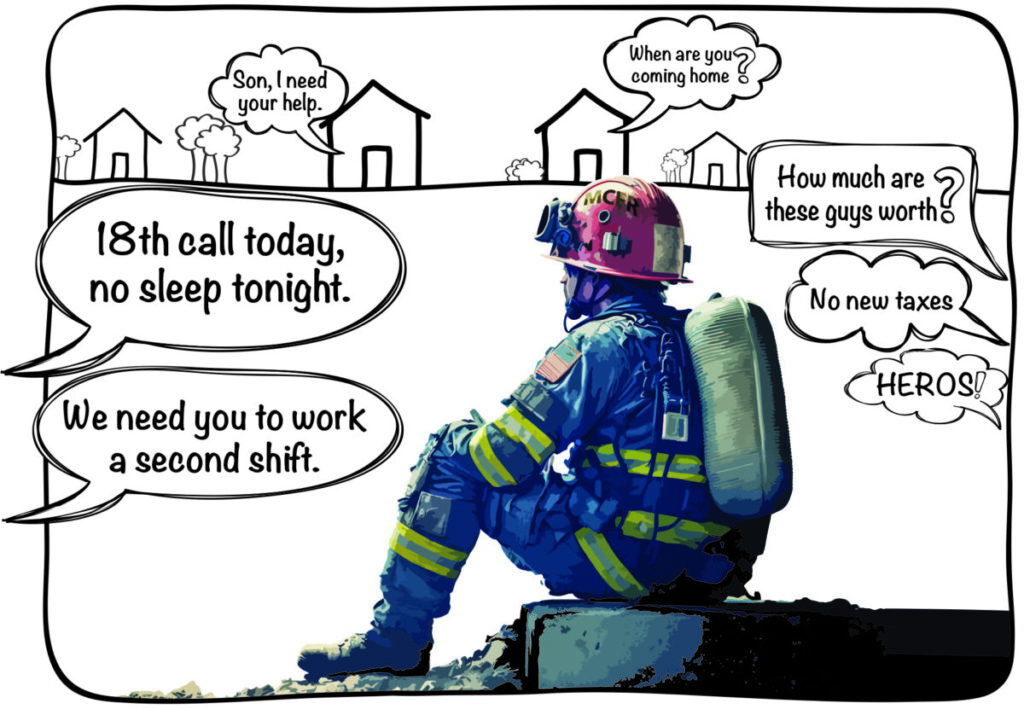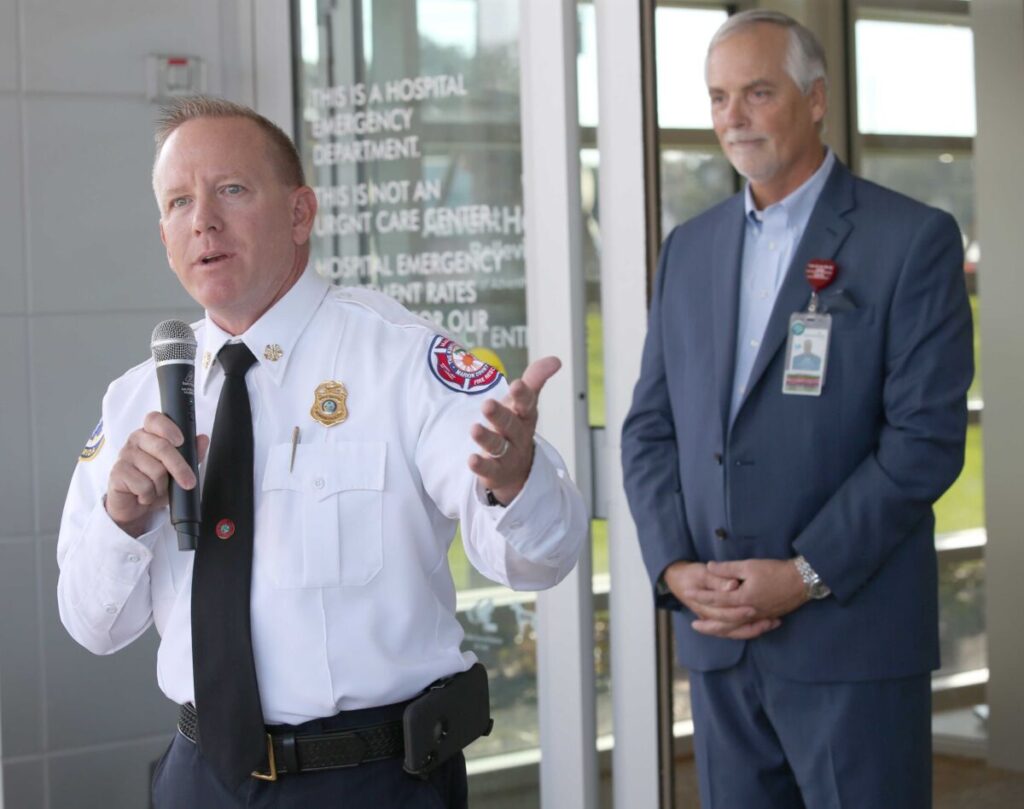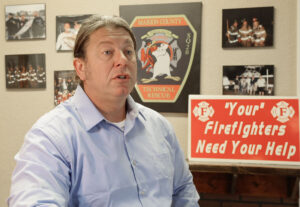When the helpers need help
Local tragedies at MCFR highlight significant needs.

[Illustration by Amy Harbert]
Jeff Gold has had a long career as a first responder in law enforcement and fire services well before being elected as a Marion County commissioner in 2016. Over the years, he has witnessed more than his share of horrors, some of which take longer than others to process.
Gold recalls arriving at an accident scene once where three children were trapped in a car that was on fire. Despite his best efforts, including sustaining burns himself, he could not rescue the children. Experiences like that, he said, especially when children are involved, stay with him.
Marion County Fire Rescue Chief James Banta can relate to the anguish.
“Sure, I drive down certain roads, and I recall what tragedy happened there,’’ he said. “You don’t just forget.”
The unique emotional challenges of being a first responder, coupled with other traditional workforce pressures such as an understaffed team struggling with an overwhelming workload, have all become part of the discussion as Marion County leaders search for ways to help those who come running when the rest of us are in danger.
Focusing their attention are two suicides within MCFR less than two weeks apart in January. There have been four deaths classified as suicides within the department since 2019; however, other department losses have left lingering questions about whether that figure is inaccurate.
Banta noted that suicides have increased among firefighters and paramedics nationwide, even while it’s often difficult to track which deaths are suicides. The Firefighter Behavioral Health Alliance (FBHA) estimates that only 40% of firefighter suicides are reported.
The 2017 Ruderman White Paper on Mental Health and Suicide of First Responders found first responders, including law enforcement, are more likely to die by suicide than in the line of duty. The report said a main reason why some first responders avoid mental health services that could help them cope with trauma is a stigma, real or perceived, about seeking help within a profession that prioritizes bravery and toughness.
Banta wants to overcome those barriers for the men and women in his department. He said meeting the emotional and mental health needs of his members has risen to the top of his very long list of needs for MCFR. “Many have expressed concerns that low pay, workload, mandatory overtime, lack of sleep, substance abuse and PTSD could be examples of the root cause,’’ he said at a news conference in February. “These are all valid issues.’’
The “Gazette” asked Banta how he planned to make an impact on the mental health of his department.

File photo: James Banta, the Marion County Fire Rescue Fire Chief, left, speaks as Joe Johnson, the President and CEO of AdventHealth Ocala, right, listens at the new AdventHealth Belleview Emergency Room on Southeast Abshier Boulevard in Belleview, Fla. on Thursday, Sept. 30, 2021
“By controlling the things we can control,” he said, adding that fire officials are looking for ways to ramp up mental health resources and adjusting policies regarding discipline for substance abuse.
Gold, who this week announced plans to resign his commission seat by the end of July, spoke about the unique nature of the job. He said he knows long hours, sleep deprivation, eating on the run and the emotional gut punches eventually catch up with those who must be ready to go on a moment’s notice.
“You know, I’ve heard people say that firefighters get paid to sleep,’’ he said. “Well, they should test how quickly they can rise from a sound sleep and be in a vehicle, on their way to a call within a minute. That’s not sleeping. People should try it sometime.”
Doing much more with much less
Following the recent suicides of MCFR Firefighter Paramedics Allen Singleton and Tripp Wooten, the International Association of Firefighters, or IAFF, the labor union representing firefighters and medical service personnel, issued a statement about conditions within MCFR.
“Marion County firefighters have a workload double that of larger departments in Florida, yet they have half the workforce. And, due to forced overtime, Marion County firefighters are working close to 70 hours a week. … Firefighters need the resources to do the job well, including a fair wage and the funding to recruit and retain a workforce. This ensures we can always answer the call, it is what municipalities owe our firefighters, their families and our communities.’’
In addition to the admonition to address workload and work conditions, the IAFF described two issues as “overarching” for the department. The first is a lack of trust in management. Many members expressed the fear of asking for help due to a perceived distrust of management and the idea that help will come in a punitive form. The second is a lack of trust in the Peer Support Team. Many members expressed views that the Peer Support Team is used to gather information that could be relayed to management as a breach of confidentiality.
Those concerns echo conversations the “Gazette” has had with MCFR members, particularly union leadership, over the past year when they have expressed distrust in county administration and the county commission.
This week, the county and union have come to a tentative agreement to support retention efforts. Additionally, the fire department is also looking for the commission to implement a fire services impact fee and rethink its fire assessment to financially support MCFR’s needs. The fire assessment, added to each property owner’s tax statement, is reevaluated every five years. Impact fees would be assessed against developers when they set out to build a new structure.
MCFR Capt. Joe Romani, supervisory president for the Professional Firefighters of Marion County, told the “Gazette” that, “I think what contributes to mental health strain is continually being asked to do things with the most basic resources. For example, the National Fire Protection Agency says that the fire engine should have four people on it. Marion County budgets for four, but we only have three. But then I’ll need to send one of those three to help an ambulance and I’m down to two firefighters on a truck. And we respond with just the two. Hell, I’ve even responded by myself with a truck to a nearby grass fire because everyone else was on a high priority call,” he said.

MCFR Capt. Joe Romani, supervisory president for the Professional Firefighters of Marion County,
“But I don’t like that those guys aren’t responding under safer conditions,’’ he said. “It’s one of the reasons I’m such a union supporter.”
An unsustainable workload
MCFR is responsible for providing not only fire services for unincorporated Marion County but also ambulance services for the entire county, including the city of Ocala. And as previously reported, the department has struggled to stay fully staffed as it competes with other counties for trained workers.
Marion County also is experiencing a population boom, and a greater demand for fire and medical services, all without any significant increase in its first responder workforce. At a recent county commission workshop, the MCFR reported to commissioners that from 2010 to 2022, they had an 8.06% increase in budgeted positions while their call volume increased by 65.17%.
The volume of calls during the usual 56-hour work shift is a big challenge for some Marion County stations, which are experiencing twice the number of calls that is considered safe. Making matters worse, the department is shorthanded by roughly 31 positions every day.. This requires the crew members to work mandatory overtime after their 56 hours.
Year to date, MCFR men and women have worked more than 14,000 hours of mandatory overtime according to union representatives.
Commissioner Gold said the numbers were a shock to hear.
“I think, as a board, the past few years we were so focused on our struggle to fill positions that we lost touch on how the increased workload factored into that equation,” he said. “I think, in hindsight, it seemed bad politically to have so many open positions, and that is why it got more attention than the call volume increase.”
Romani said union membership is increasingly asking to understand funding mechanisms for the county’s fire services such as impact fees and fire assessments because they want to understand why some of the most basic resources cannot be provided.
During a recent Marion County Hospital District board meeting, during a conversation exploring resources available to improve mental health services for members of the department, County Commissioner Kathy Bryant said, “If you asked the union, money fixes the problem” to the immediate workload capacity dilemma.
MCHD board chair Rich Bianculli responded rhetorically, “But when the problem is fixed [staffing shortage], and they aren’t worth as much, who’s stuck with the bill?” To which Bryant replied, “That’s what I’m saying.”
Policy changes under scrutiny
Up to this point, substance abuse has led to an automatic dismissal for an MCFR member. But Banta said the department is adjusting that policy and is now looking at substance abuse as a mental health issue. His team is looking for a “last chance” option that would allow for addiction treatment before automatic dismissal.
At a recent town hall meeting for the department, Banta encouraged the men and women in the MCFR not to hold back from speaking up if they saw one of their fire family struggling with substance abuse. He hoped that amending the policy would make more firefighters comfortable being proactive in helping each other.
One firefighter during the town hall asked how that substance abuse treatment would impact a person’s potential for promotion. Banta said he was unsure now as the policy was still being developed. Currently, those in the department seeking mental health support must go through their health insurance.
Banta said that through peer support efforts the department is trying to take away some of the hurdles first responders may face when seeking mental health help, whether they be financial or access under their unique time constraints.
Both Banta and Gold said the support of their family over the years has been key to maintaining their mental health. That support, however, can be strained when a 100-hour workweek leaves their families frustrated about managing a household without them.
“Station family” and the “brotherhood” continue to play significant roles in maintaining a member’s mental health, and the recent losses have hit the MCFR hard. In addition to the recent suicides, the department has lost significant numbers of experienced personnel to other agencies in the state.
With each loss, there is an impact on morale and the department’s culture.
“Losing someone you’ve basically lived with for a third of your life…yeah, it’s going to be difficult,” said Romani, who has been in the fire service for 22 years.
He pointed out that “station family’’ is particularly important to young workers.
“I’ve got two paramedics under the age of 25 making life and death calls in the field,’’ Romani said. “That’s a lot for a 25-year-old who may or may not have a support structure. That’s why it’s so important to have people in the field with experience working along with them.”
Romani said the habitual mindset of a firefighter paramedic to just “make things work” on one hand while feeling like “you don’t have support or that you’re in this on your own or that nobody understands what you’re going through, that compounds this mental health issue that they might be having other issues outside of work.”
Firefighters are often called heroes. Does that title place additional burdens on first responders?
“I don’t think anybody in the actual field carries that word,’’ Romani said. “Some of us are here for a job. Some of us are here because it’s the most exciting job they can find. Some because it’s something you’ve always wanted to do since they were they first saw the fire truck from elementary school.”
Banta, a 30-year fire service veteran who worked his way up in Marion County, told the “Gazette” that a lot has changed about the mental health conversation since he started.
“You know the old ways of suck it up buttercup when I started have drastically changed. Then, there was no conversation. You would go to bad calls and see very bad things. It was only the camaraderie around the station, your station family, that usually supported you through all that.”
Banta said previously, there “was really no acknowledgment of, hey, these things 20 or 30 years down are still going to be troublesome.” But in the last 15 years, there has been a progressive shift to address the issue, such as debriefs to help process incidents.
“I think we have to be strong for the community, and sometimes that makes it hard to admit we need help. We’re all human. We’re all vulnerable and we all need some sort of support. As the fire chief, I have to be strong. Yet, it’s also important for me to show that I get help if I need it,’’ he said.
Banta said he tries to stress to his crews that they remember, “Yes, we are involved in a lot of bad things, but we do so much good. In the same shift, you could deliver a baby on one call and then be the last person to speak to someone before they die on another.”
He quickly added, “The responsibility is powerful, but it’s really the best career in the world.”





